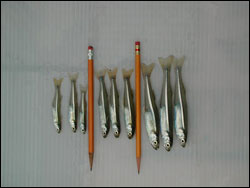Fewer fish eggs, smaller fish result from over-fishing

The figure shows the decrease in body size in Atlantic silverside as found by a research team led by UCR graduate student Matthew Walsh. The silverside, having been reared for five generations in laboratory experiments, are all the same age. The fish shown here are from the fifth generation. The fish on the left are from populations from which large individuals were harvested over five generations; the fish in the middle are from populations from which fish were harvested at random over five generations; and the fish on the right are from populations from which only small fish were harvested over five generations. Photo credit: M. Walsh.
UCR graduate student leads research showing how evolution slows recovery of fish population
The practice of harvesting the largest individuals from a fish population introduces genetic changes that harm the overall fish population, a UC Riverside graduate student and colleagues have determined. Removing the large fish over several generations of fish causes the remaining fish in the populations to become progressively smaller, have fewer and smaller eggs with lower survival and growth, and have lower foraging and feeding rates, the researchers report.
“We have shown for the first time that many traits correlated with fish body-size may be evolving in response to intense fishing pressure,” said Matthew R. Walsh, a graduate student in UCR’s Department of Biology, who led the research project. “Our experiment is the only one to simulate the evolutionary impacts of harvesting in a laboratory setting.”
Study results will appear in the February issue of Ecology Letters.
Focusing on the Atlantic silverside, a commercially exploited fish commonly found along the east coast of North America, the researchers conducted harvesting experiments under a variety of regimens. They reared the fish for five generations, selecting out the largest individuals from each generation. They then evaluated multiple traits, such as body size and the number of eggs, in fish from the fifth generation.
“We found that removing the large fish in each generation, as in most fisheries, caused declines in many traits spanning the life history, physiology and behavior of this marine fish,” said Walsh, the first author of the paper. “We know that commercially exploited populations of fish often are slow to recover when fishing pressure is reduced. Our research indicates that the over-harvested fish stocks are slow to rebound because fishing selects for evolutionary changes in the life history of the fish. As a result, to effectively manage exploited fisheries, the impacts of these genetic changes must be considered and accounted for. Because the changes in the fish are genetic, they don’t immediately go away when fishing ceases.”
Walsh came to UCR in fall 2004, where he is working toward a doctoral degree under the advisement of David Reznick, professor of biology. The research on the Atlantic silverside was done in 2002 while Walsh was a graduate student at Stony Brook University, New York, from where he obtained his master’s degree in marine and atmospheric sciences in 2003.
Besides Walsh, Stephan B. Munch and David O. Conover of Stony Brook University; and Susumu Chiba of the Tokyo University of Agriculture, Japan, collaborated on the study, which was funded by the New York Sea Grant, the National Science Foundation, and the Pew Institute for Ocean Science of the Pew Charitable Trusts.
The University of California, Riverside is a major research institution. Key areas of research include nanotechnology, genomics, environmental studies, digital arts and sustainable growth and development. With a current undergraduate and graduate enrollment of more than 16,600, the campus is projected to grow to 21,000 students by 2010. Located in the heart of inland Southern California, the nearly 1,200-acre, park-like campus is at the center of the region’s economic development.
Media Contact
More Information:
http://www.ucr.eduAll latest news from the category: Ecology, The Environment and Conservation
This complex theme deals primarily with interactions between organisms and the environmental factors that impact them, but to a greater extent between individual inanimate environmental factors.
innovations-report offers informative reports and articles on topics such as climate protection, landscape conservation, ecological systems, wildlife and nature parks and ecosystem efficiency and balance.
Newest articles

Security vulnerability in browser interface
… allows computer access via graphics card. Researchers at Graz University of Technology were successful with three different side-channel attacks on graphics cards via the WebGPU browser interface. The attacks…

A closer look at mechanochemistry
Ferdi Schüth and his team at the Max Planck Institut für Kohlenforschung in Mülheim/Germany have been studying the phenomena of mechanochemistry for several years. But what actually happens at the…

Severe Vulnerabilities Discovered in Software to Protect Internet Routing
A research team from the National Research Center for Applied Cybersecurity ATHENE led by Prof. Dr. Haya Schulmann has uncovered 18 vulnerabilities in crucial software components of Resource Public Key…





















